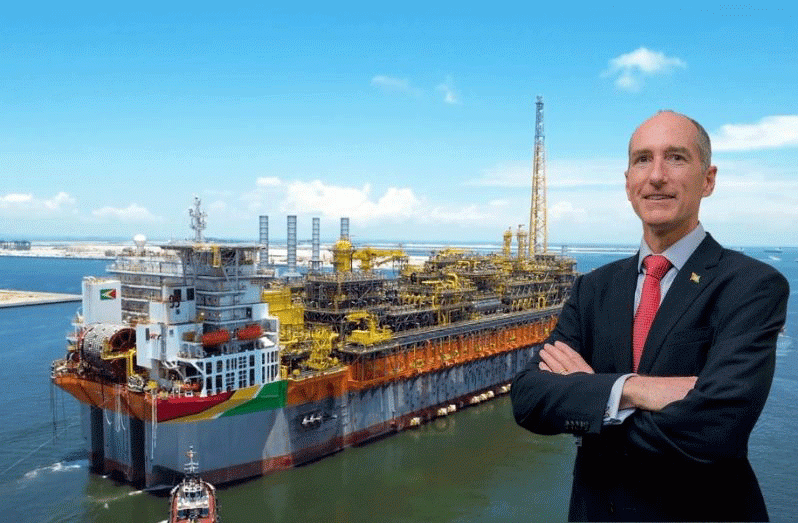notes Guyana’s offshore oil prospects remain priority
IN the face of Venezuela’s protests against the auction of offshore oil blocks, Alistair Routledge, the President of ExxonMobil Guyana, asserted on Tuesday that the oil giant remains resolute in its commitment to harnessing Guyana’s natural resources.
“We have not been scared away by Venezuela. You know that’s why we are still working in Guyana, that’s why we anticipate continuing to do so in decades to come,” Routledge said during a press engagement.
Guyana and Venezuela have been engaged in a long-standing controversy over their borders. The International Court of Justice (ICJ) in April ruled it had jurisdiction over the issue, which could determine which country has rights to territory rich in oil and gas, especially offshore.
Last month, Venezuela’s government criticised Guyana’s offshore oil bidding round and said companies seeking up to eight blocks will not have rights to explore the maritime areas, which would be subject to international claims.
Guyana had received bids from companies including Exxon Mobil (XOM.N) and TotalEnergies (TTEF.PA) to allocate eight new offshore oil blocks, a move to diversify the portfolio of energy firms participating in its nascent industry, currently dominated by an Exxon-led consortium.
However, on Tuesday, Routledge told the media that Exxon is still awaiting word from the Government on whether the bid is accepted or not.
“That process is still ongoing,” Routledge said as he added that he is not worried about Venezuela’s claim as it relates to the area in question.
The government is expecting the evaluation to be done in October, and the agreement will be concluded before the end of the year. Guyana had received 14 offers from six bidders for eight of the oil blocks.
From producing no crude at all, Guyana produces an average of some 400,000 barrels of oil per day. This is expected to increase to 600,000 barrels per day by 2024.
At present, Guyana’s total recoverable oil reserves stand at more than 11 billion barrels of oil, with crude oil reserves ranking at number 17 in the world and third in Latin America and the Caribbean.
Recently, President Dr. Irfaan Ali reaffirmed Guyana’s commitment to defending its sovereignty and sovereign rights over its territory, in light of Venezuela’s objection to the auction.
President Ali responded firmly, stating: “The Government of Guyana reserves the right to pursue economic development activities in any portion of its sovereign territory or any appurtenant maritime territories.”
He said too: “Any unilateral attempt by Venezuela to restrict the exercise by Guyana of its sovereignty and sovereign rights will be wholly inconsistent with the Geneva Agreement and the rule of international law.”
In April of this year, the World Court ruled that the case Guyana brought before it seeking to affirm the validity of the 1899 Arbitral Award settling the boundaries between it and Venezuela was admissible.
This meant that the court could move forward with hearing the substantive case on its merits, of whether the 1899 arbitral award settling the boundaries of the two countries is valid and binding.
The ruling marked the second time that the international court has rejected jurisdictional objections raised by Venezuela.
Guyana moved to the ICJ with its case in March 2018, challenging the non-participating Bolivarian Republic of Venezuela over its disagreement on the legal validity and binding effect of the 1899 Award.
Venezuela maintained that the ICJ was without jurisdiction to hear the case and refused to participate in the court proceedings.
The Spanish-speaking country had claimed that it is the “sole indisputable inheritor” of the Essequibo region and the Monetary Gold Principle.
Although Venezuela had claimed that the ICJ did not have jurisdiction to hear the substantive case, the country made a u-turn following the court’s December 2020 ruling on that aspect of the case. Venezuela on that occasion contended that Guyana had no standing in the matter. The court unanimously rejected Venezuela’s objection.
Guyana is seeking a final and binding judgement that the 1899 Arbitral Award, which established the location of the land boundary between then British Guiana and Venezuela, remains valid and that the Essequibo region belongs to Guyana and not Venezuela.



.jpg)








